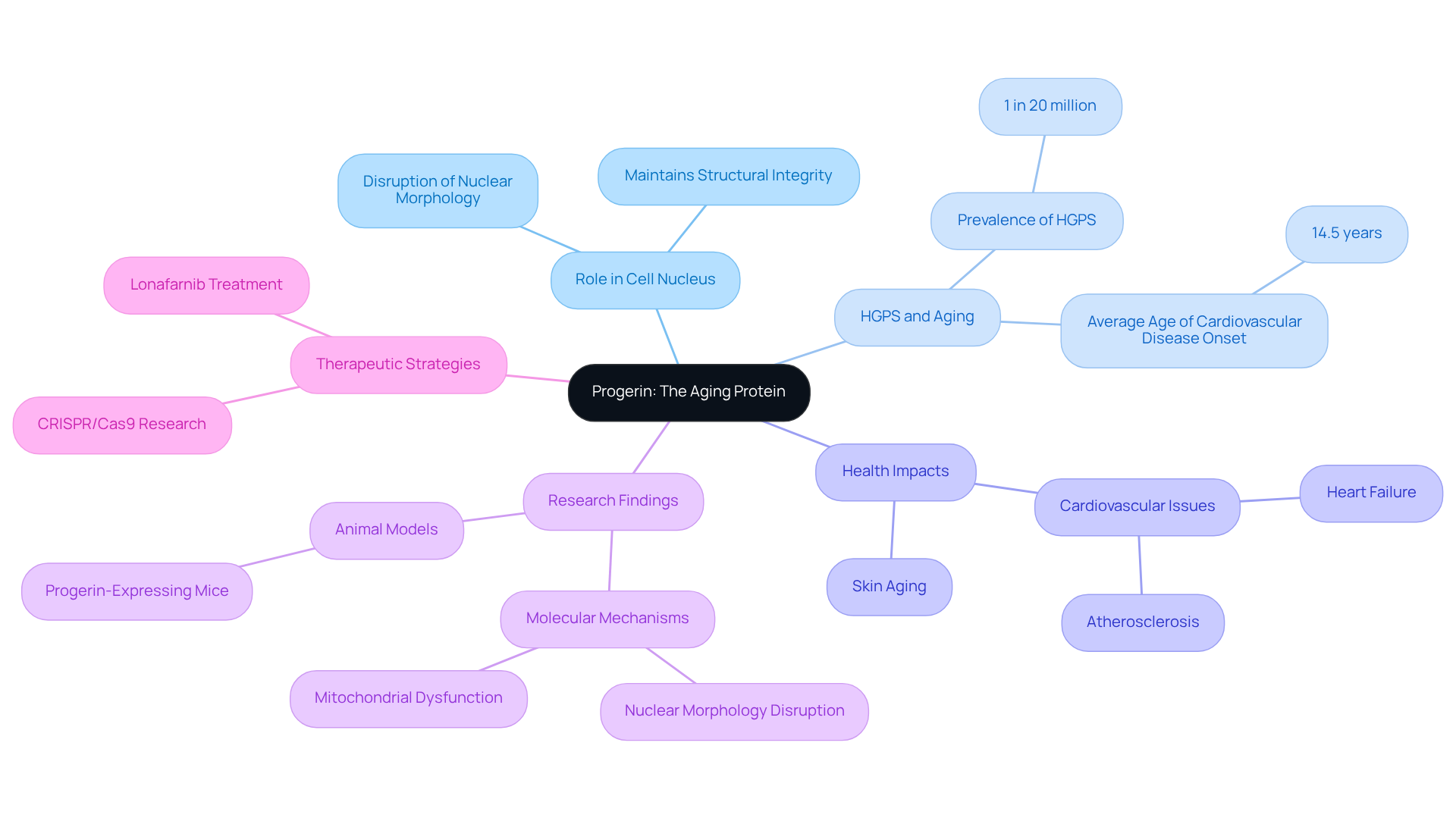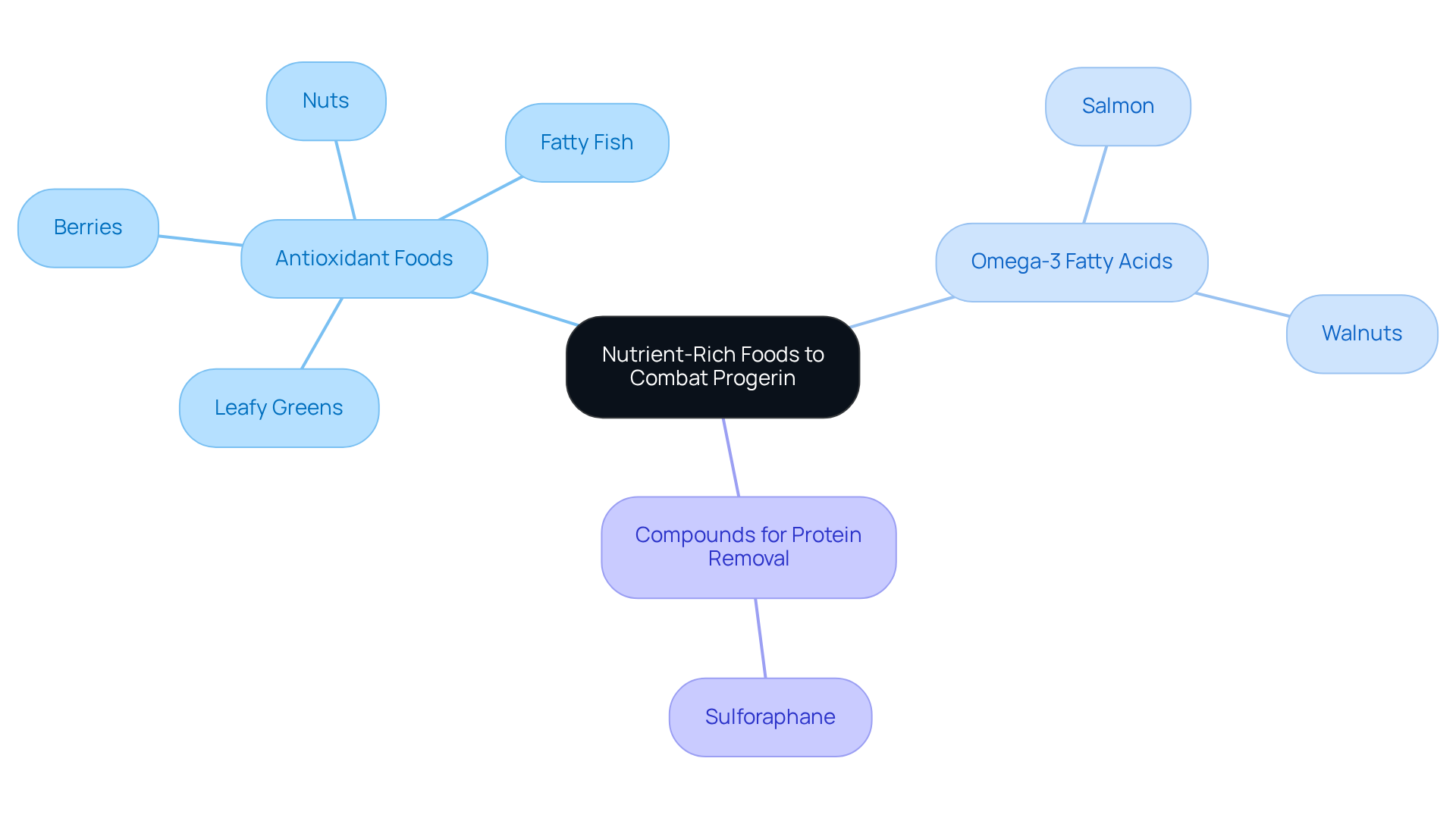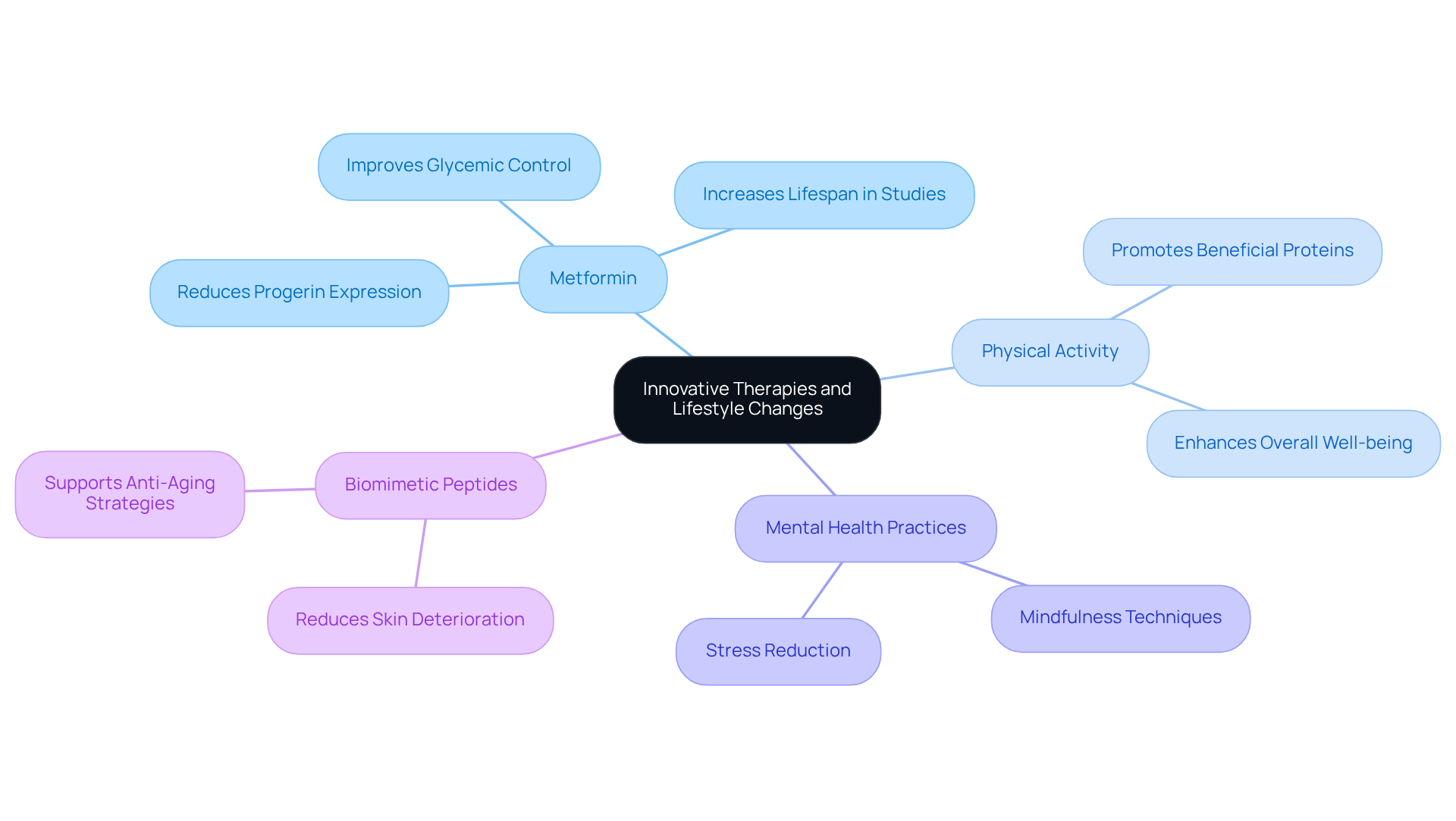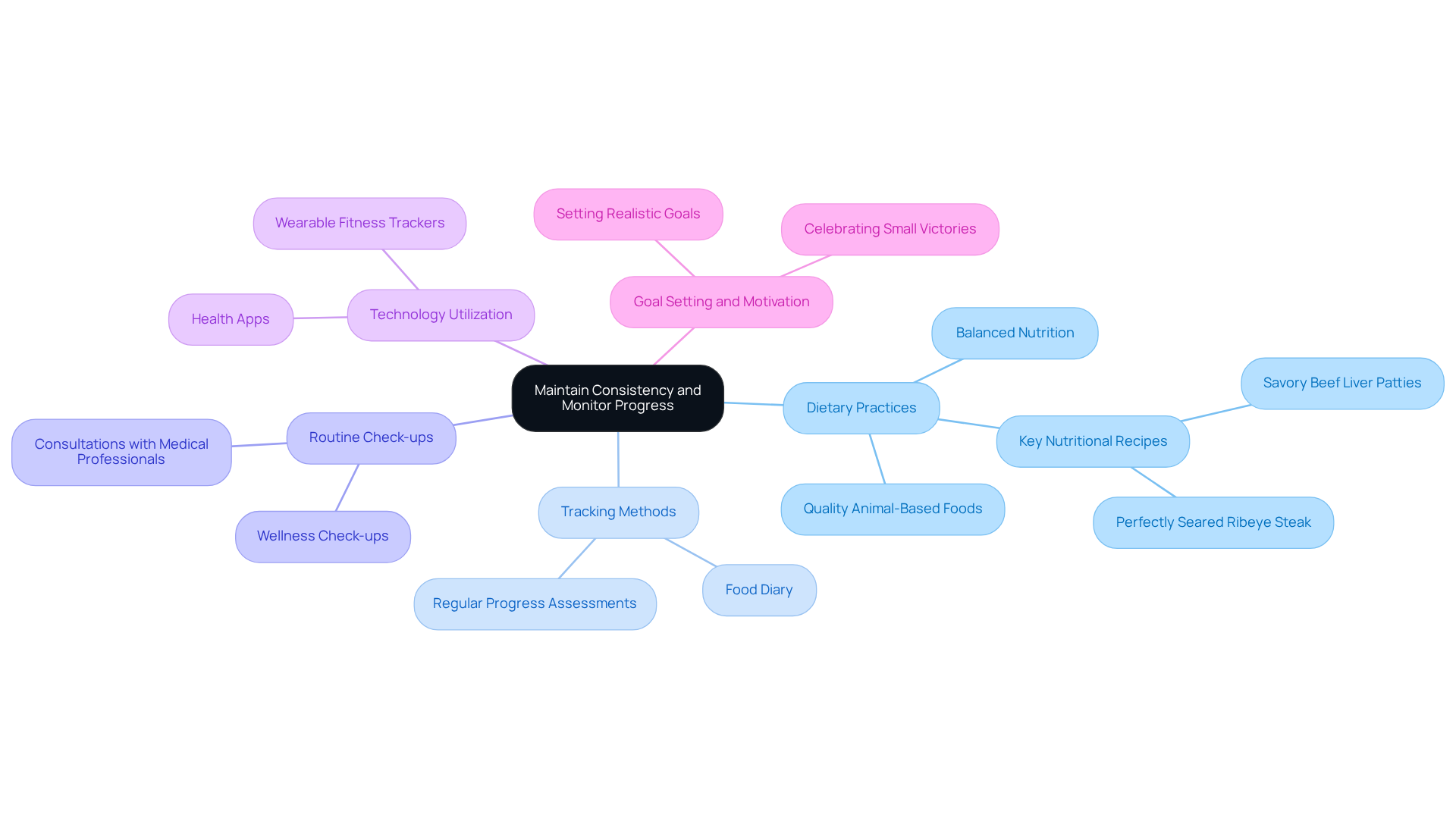4 Strategies for Managing Progerin Anti Aging Effectively
Overview
The article explores four effective strategies for managing progerin, a protein associated with accelerated aging. These strategies emphasize:
- Dietary changes
- Innovative therapies
- Lifestyle modifications
- The critical role of consistency
Evidence supports these approaches, demonstrating how nutrient-rich foods can combat oxidative stress and how medications like metformin can help reduce harmful protein expression. Additionally, monitoring health progress is essential to enhance overall aging outcomes. By implementing these strategies, individuals can take proactive steps toward healthier aging.
Introduction
Understanding the complexities of aging has never been more critical. Researchers are uncovering the role of progerin, a protein linked to accelerated aging and serious health issues. This article delves into effective strategies for managing progerin levels. It highlights how:
- Dietary choices
- Innovative therapies
- Consistent lifestyle practices
can significantly impact cellular aging. Yet, amidst these promising approaches, a pressing question remains: how can individuals effectively integrate these strategies into their daily lives to combat the relentless effects of aging?
Understand Progerin: The Aging Protein
Progerin, a mutant variant of the lamin A protein, plays a crucial role in maintaining the structural integrity of the cell nucleus. The accumulation of progerin, which is linked to progerin anti aging, is a hallmark of Hutchinson-Gilford Progeria Syndrome (HGPS), a rare genetic disorder that accelerates the aging process, with a prevalence of 1 in 20 million. Typically, as individuals age, levels of specific proteins, such as progerin anti aging, gradually rise, leading to cell dysfunction, genomic instability, and the emergence of age-related illnesses, particularly cardiovascular issues and skin aging. Alarmingly, studies reveal that children with HGPS often develop cardiovascular disease by an average age of 14.5 years, underscoring the severe consequences of protein accumulation.
Recent research has employed various biological and animal models to clarify the molecular mechanisms behind HGPS. For instance, findings suggest that a particular protein disrupts several biological processes, including nuclear morphology and mitochondrial function, resulting in significant health challenges. In a notable case study, progerin-expressing endothelial cells exhibited a diminished wound healing rate under physiological shear stress, emphasizing the protein’s harmful effects on cell proliferation and repair mechanisms.
Statistics indicate that progerin-driven atherosclerosis is a leading cause of mortality in specific mouse models, with pronounced cardiovascular pathology observed in older progeria mice compared to controls. This highlights the urgent necessity for targeted therapeutic strategies, such as progerin anti aging, to address the cellular impacts of aging-related proteins. As researchers continue to explore gene editing therapies, such as CRISPR/Cas9, promising results have emerged, suggesting that targeting lamin A and progerin anti aging could enhance health and longevity in progeria models. Understanding these mechanisms is vital for developing effective strategies to mitigate the impacts associated with progeria. Furthermore, as Bulmaro Cisneros noted, studying HGPS offers valuable insights into the aging process, emphasizing the need for ongoing research and clinical trials to translate these findings into viable treatments.

Incorporate Nutrient-Rich Foods to Combat Progerin
A diet rich in antioxidants and anti-inflammatory foods plays a significant role in regulating protein levels. Leafy greens, berries, nuts, and fatty fish are well-known for their high antioxidant content, which helps combat oxidative stress—a key contributor to the accumulation of aging proteins, such as progerin, thus playing a role in progerin anti aging. Furthermore, foods abundant in omega-3 fatty acids, such as salmon and walnuts, promote cellular health and mitigate inflammation.
In addition, research indicates that compounds like sulforaphane, found in cruciferous vegetables, may enhance the removal of specific proteins through autophagy. This underscores the importance of a nutrient-dense diet in combating the effects of aging, particularly in relation to progerin anti aging. By incorporating these foods into your daily meals, you can actively support your body’s health and resilience against age-related changes.

Adopt Innovative Therapies and Lifestyle Changes
Incorporating innovative therapies alongside dietary changes is essential for effectively managing cellular aging levels and promoting progerin anti aging. Have you considered the impact of metformin? Significantly, this medication has shown an ability to diminish age-related symptoms through mechanisms associated with progerin anti aging by reducing harmful protein expression. Studies suggest that metformin can activate a biochemical switch, leading to the production of non-toxic proteins.
Moreover, consistent physical activity encourages the creation of advantageous proteins that mitigate the harmful impacts of certain substances, ultimately leading to enhanced well-being. Engaging in activities that promote mental health, such as mindfulness practices and stress reduction techniques, can further bolster overall health and longevity.
Furthermore, have you explored advanced options like biomimetic peptides in skincare? Investigating these choices may assist in reducing the effects of certain proteins on skin deterioration, which is essential for a comprehensive strategy for progerin anti aging to address the aging process. By integrating these approaches, we can take significant steps towards healthier aging.

Maintain Consistency and Monitor Progress
To achieve optimal results in progerin anti aging management, consistency in dietary and lifestyle practices is crucial. Keeping a food diary serves as a practical method for tracking nutrient intake and identifying areas for improvement. Furthermore, routine wellness check-ups are essential; statistics indicate that merely 13.8% of older individuals fulfill the standards for successful development. This emphasizes the significance of continuous consultations with medical professionals for insights into progress and necessary modifications.
In addition, utilizing technology, such as health apps, can significantly enhance the monitoring of physical activity and dietary habits. Setting realistic goals and celebrating small victories not only boosts motivation but also fosters commitment to a healthier lifestyle. As a result, this consistent effort is vital for effective progerin anti aging management and contributes to the overall journey of healthy aging.

Conclusion
Understanding and managing progerin is pivotal in the quest for effective anti-aging strategies. Progerin, a detrimental protein linked to accelerated aging and various health issues, underscores the importance of targeted interventions that can significantly improve cellular health and longevity. By focusing on dietary choices, innovative therapies, and consistent lifestyle changes, individuals can actively combat the effects of progerin and promote healthier aging.
Key insights from this article highlight the critical role of nutrient-rich foods, such as antioxidants and omega-3 fatty acids, in regulating progerin levels. Furthermore, innovative therapies like metformin and biomimetic peptides, combined with regular physical activity and mindfulness practices, present a comprehensive approach to managing the impacts of aging. Consistency in these efforts, alongside monitoring progress through technology and regular health check-ups, is essential for achieving optimal results in progerin anti-aging management.
Ultimately, the journey toward healthier aging involves a multi-faceted approach that integrates dietary, therapeutic, and lifestyle strategies. By embracing these practices, individuals not only enhance their well-being but also contribute to a broader understanding of aging and its underlying mechanisms. The significance of ongoing research and personal commitment cannot be overstated, as they pave the way for advancements in treatments and a more profound grasp of progerin’s role in the aging process.
Frequently Asked Questions
What is progerin and its significance in aging?
Progerin is a mutant variant of the lamin A protein that is crucial for maintaining the structural integrity of the cell nucleus. Its accumulation is linked to Hutchinson-Gilford Progeria Syndrome (HGPS), a rare genetic disorder that accelerates the aging process.
What is Hutchinson-Gilford Progeria Syndrome (HGPS)?
HGPS is a rare genetic disorder with a prevalence of 1 in 20 million that causes rapid aging in affected individuals. It is characterized by symptoms such as cardiovascular disease and skin aging due to the accumulation of progerin.
How does progerin accumulation affect health?
The accumulation of progerin leads to cell dysfunction, genomic instability, and age-related illnesses, particularly cardiovascular issues. Children with HGPS often develop cardiovascular disease by an average age of 14.5 years.
What are the effects of progerin on cellular functions?
Progerin disrupts several biological processes, including nuclear morphology and mitochondrial function, which can lead to significant health challenges. It negatively impacts cell proliferation and repair mechanisms, as demonstrated by diminished wound healing rates in progerin-expressing endothelial cells.
What role does progerin play in atherosclerosis?
Progerin-driven atherosclerosis is a leading cause of mortality in specific mouse models, with older progeria mice showing pronounced cardiovascular pathology compared to controls.
What therapeutic strategies are being explored for progerin-related conditions?
Researchers are exploring targeted therapeutic strategies, such as progerin anti aging and gene editing therapies like CRISPR/Cas9, to address the cellular impacts of aging-related proteins and enhance health and longevity in progeria models.
Why is research on HGPS important for understanding aging?
Studying HGPS provides valuable insights into the aging process and emphasizes the need for ongoing research and clinical trials to develop effective treatments for aging-related conditions.






